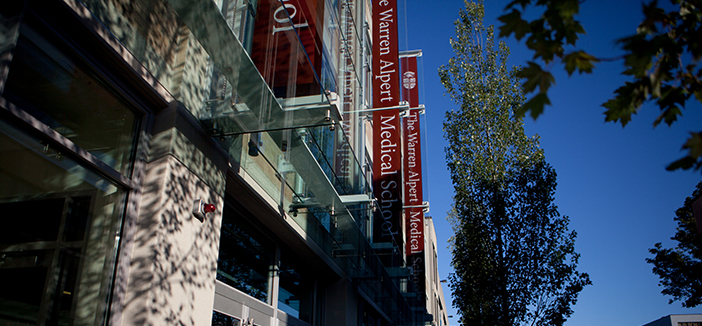Real change demands a radical rethinking.
The Warren Alpert Medical School has been working to foster a more diverse, inclusive learning environment and to include more accurate discussion of race in the medical curriculum. This past summer, a coalition of medical student affinity groups—the Student National Medical Association, Latino Medical Student Association, Asian Pacific American Medical Student Association, American Medical Women’s Association, and Spectrum (the LGBTQ student association)—called upon the Medical School’s leadership to take further decisive actions against structural racism and anti-Black violence that plagues underrepresented communities.
We are grateful to the student groups for the extensive work they have done to build a framework for change. You can read a complete response to the issues they raise here. Here we present a detailed plan to address the treatment of race within the medical curriculum and to significantly increase the amount of anti-racist education required for students and faculty.
OVERHAUL ANTI-RACIST EDUCATION
The Office of Medical Education (OME) continues to work with the leaders of the Health Systems Science and Doctoring courses on the integration of additional anti-racism curriculum material. This year, all incoming first-year medical students were required to read Fatal Invention by Dorothy Roberts and attend mandatory small group discussions on the book led by trained faculty. Rising second-year students read How to Be an Antiracist by Ibram X. Kendi, again with mandatory small group discussions and preceding faculty preparation. Additionally, the Race and Medicine section in the Health Systems Science course was moved forward with an added focus on racism and oppressive policies.
Doctoring
Students have raised specific concerns about the Doctoring course, particularly in the small group setting. A number of changes have been made in order to recruit a more diverse faculty, especially those who identify as Black, indigenous, and people of color (BIPOC). For the upcoming academic year, the faculty hiring process included:
■ A formal application process with specific questions on diversity, the learning environment, as well as discussing race, gender, and sexual orientation.
■ Required interview with a standardized interview form with members of OME, Office of Student Affairs (OSA), and Office of Diversity and Multicultural Affairs (ODMA).
■ Interview questions about diversity and inclusion.
Doctoring Peer Mentor Program
The DPM program pairs rising second-year students with first-year Doctoring small groups. Students are nominated by their Doctoring small group faculty and OME reviews the list of nominations. In the past, selections were made based on small group participation, clinical skills, and OSCE performance. We realize this process led to significant underrepresentation of BIPOC students due to bias at many levels. This year, we will use the following process to select DPMs:
■ We will invite students to self-nominate (or nominate a peer) and complete a formal application. We will invite students to provide demographic information to avoid assumptions about demographics.
■ For those nominated, feedback will be sought from Doctoring faculty and Mary B. Arnold Mentors.
■ Members of OME, OSA, and ODMA will review applications.
We will monitor the selection process and outcomes and continue to refine this process to ensure equitable representation of BIPOC students.
Doctoring Small Group Faculty
For this academic year, Doctoring small group faculty must complete:
■ Four anti-racism modules prior to the start of classes
■ One virtual debrief session
■ Required student summer reading
■ Additional modules on trauma-informed care, assessment, feedback, and small group facilitation with longitudinal threads of anti-racism and ways to minimize bias
In addition, all Doctoring small group faculty will be observed at least once throughout the semester and given feedback through the Office of Faculty Professional Development.
Curricular Changes
Rather than focus on incorporating stand-alone sessions that focus on anti-racism, a longitudinal thread will weave across several aspects of the curriculum. This will include:
■ Required summer readings incorporated throughout the academic year
■ Weekly faculty facilitators’ guides with discussion points from the summer readings as well as a new list of readings and resources
■ Former anti-racist clinical case presentation session on written documentation incorporated into case write-up and oral presentation materials from the start of Year 1
■ Bystander training for first- and second-year students as part of the Doctoring curriculum, using a new resource on microaggressions
■ 70% grade or better on the IMS exam multiple-choice questions in order to pass the Health Systems Science course; small group leaders trained to give more critical feedback on reflective narratives, which also count toward students’ final grades.
Ability VII
OME worked with student leaders to revise one of our core competencies (the Nine Abilities) to reflect the Medical School’s dedication to racial justice. Ability VII, Health Equity and Racial Justice, will read:
The competent graduate practices medicine in a broader context by understanding the many factors that influence health, disease, and disability. The competent graduate recognizes the inextricable role of social and racial justice in medicine to achieve positive health outcomes for all people. The graduate characterizes social issues that impact their patient population and understands different models of action that makes their medical practice more ethical and inclusive.
The Ability includes five specific, measurable medical education program objectives that students must demonstrate throughout their medical school career. For example: 7.5 Applies social justice theories and resources to frame anti-racist advocacy within the student’s future practice of medicine. These objectives are mapped to all required courses and clerkships to ensure that they are taught throughout the curriculum. Assessments are integrated across the curriculum to ensure measurement of student achievement.
Current curriculum on health inequity and racial injustice will be mapped to this ability. In addition, OME proposed a required four-week clerkship in the third year on Racial Justice and Health Inequity, in which students will gain a deep understanding of topic areas such as critical race theory, intersectionality, and the inequities that pervade the US health care system. For incoming students, we used anti-racist training developed by the University of Washington as a framework.
OME also funded a student on the Academic Scholars Program to identify lecture slides that inappropriately depict race—such as using race as a risk factor for disease processes. This work will continue as a subgroup of the Committee on Diversity and Inclusive Teaching and Learning.
INVESTIGATE DISPARITIES IN REMEDIATION
The affinity groups noted that students from groups underrepresented in medicine (URiM) need to remediate (repeat) coursework at a disproportionate rate. We have put a number of systems in place to identify and support students having academic difficulty, but more needs to be done to truly investigate the root cause of disparities in remediation. We have created a deidentified database to examine why URiM students may be overrepresented in this regard. In conjunction with the Committee on Diversity, Inclusive Teaching, and Learning and the Medical Curriculum Committee, we will use this analysis to inform decisions around medical school policy and decision-making as it concerns URiM students.
As always, we will work to continuously improve and expand these actions through evaluation and feedback from students. We stand behind our commitment to racial justice and health equity and to moving these and other initiatives forward.




